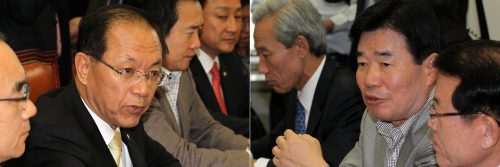The Korean parliament is expected to vote on the ratification of a free trade pact with the U.S. on Monday, after a last round of discussions over the long-delayed deal.
The U.S. Congress passed the deal as President Lee Myung-bak was visiting Washington for summit talks with President Barack Obama earlier this month.
While Lee and his Grand National Party have been stepping up efforts to follow Washington in securing parliamentary approval as soon as possible, liberal opposition parties maintain adjustments must be made to clauses they claim are in favor of the U.S.
The Lee administration wants the FTA to take effect by Jan. 1, at the latest.
Rival parties are mostly disputing over the Investor-State Dispute Settlement, or the ISD, clause critics believe could harm small-tier local firms and retailers, and protection measures for local farmers. Parties held three rounds of unsuccessful debates last week, agreeing to hold a “final debate” Monday.

Hwang Woo-yea (second from left), floor leader of the ruling Grand National Party, and Kim Jin-pyo (second from right), floor leader of the main opposition Democratic Party, speak during a parliamentary meeting on the KORUS FTA on Sunday. (Yonhap News)
The Monday debate will be held for three hours, with the GNP and the main opposition Democratic Party each getting an hour to present their views, Nam Kyung-pil, head of the parliamentary trade committee, said, closing the session Saturday.
The National Assembly will hold the vote on ratification immediately after the debate, he said.
Last week, Lee had called senior opposition party legislators, asking for their cooperation in prompt ratification of the FTA.
Speaking on the phone with lawmakers including Kim Jin-pyo, floor leader of the main opposition party, and Sim Dae-pyung, leader of the minority Liberty Forward Party, Lee asked for “a rational decision,” adding the government was “open to any solution” agreed upon by all parties.
The FTA “may be of some threat to the agricultural sector, but is, at the same time, an opportunity to bolster national competitiveness,” Lee was quoted as saying by unnamed aides. “This is an investment that will lead to development of the agricultural sector in the long run.”
Opposition parties believe the ISD clause has the potential of causing legal disputes with U.S. investors who want the Korean government to scrap its protection policies for small firms and retailers. The ruling party believes the clause will not harm the freedom of government policies.
Attending the Saturday parliamentary debate session, Seoul’s chief trade negotiator Kim Jong-hoon emphasized both sides had agreed not to raise objection to policies related to national safety.
The government has also promised to expand the amount of support for the agricultural sector from the current 2.21 trillion won once the FTA takes effect.
Last week, a group of opposition lawmakers occupied the parliamentary trade committee room to stop the ruling party passing the bill to send it to the main vote.
Lee’s conservative party has a majority of 171 seats in the 299-member unicameral house, enough to pass the bill on its own should opposition parties continue to disagree. The party, however, has been careful not to upset voter sentiment by driving the law through ahead of the Seoul mayoral vote slated for Wednesday.
By Shin Hae-in (
hayney@heraldcorp.com)

![[Exclusive] Korean military set to ban iPhones over 'security' concerns](http://res.heraldm.com/phpwas/restmb_idxmake.php?idx=645&simg=/content/image/2024/04/23/20240423050599_0.jpg&u=20240423183955)

![[Graphic News] 77% of young Koreans still financially dependent](http://res.heraldm.com/phpwas/restmb_idxmake.php?idx=645&simg=/content/image/2024/04/22/20240422050762_0.gif&u=)


